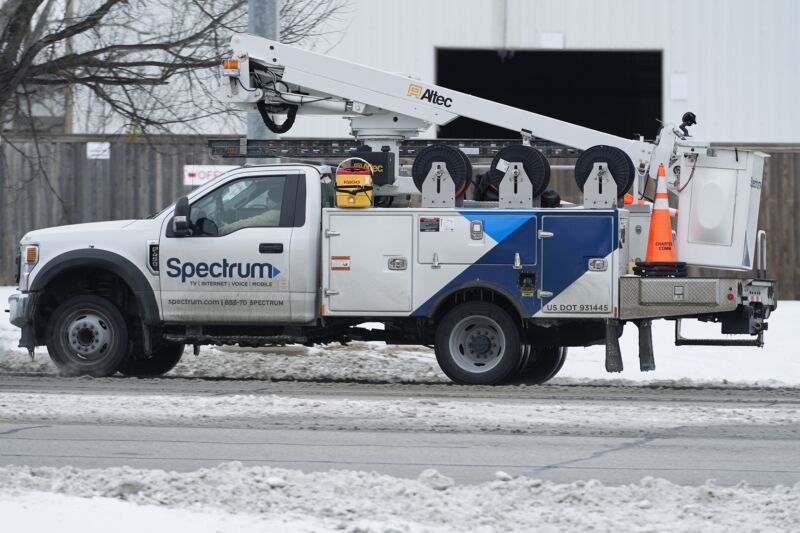
A Texas jury last week found that Charter Communications was responsible for the death of an 83-year-old woman murdered in her home by a Spectrum cable technician who is now serving a life sentence.
A six-member jury at Dallas County Court awarded the family of murder victim Betty Thomas $375 million in compensatory damages, of which Charter would have to pay 90 percent ($337.5 million). The jury unanimously found that Charter's negligence was a proximate cause in the 2019 death and assigned 90 percent of the responsibility to Charter and 10 percent to convicted murderer Roy Holden, according to a court document. Holden, who robbed and murdered Thomas one day after a service call, pleaded guilty and was sentenced to life in prison in April 2021.
Charter's financial liability could end up being much higher because the jury has not yet decided on punitive damages. The punitive damages phase of the trial is scheduled to begin on July 6.
Attorneys for Thomas' family reportedly said that testimony during the 11-day trial "revealed systemic failures of the company's pre-employee screening, hiring and supervision practices, as well as failures to address known warning signs and control the off-duty use of company vehicles—all of which led to the preventable murder of Betty Thomas of Irving." The family's attorneys also said Charter "inexplicably ended its pre-employment screening program" after purchasing Time Warner Cable in 2016 and that Holden was hired "even though a cursory review of his previous employers would have revealed firings for forgery, falsifying documents and harassment of fellow employees."
According to other testimony at the trial, "Thomas' family later received a $58 charge for Holden's service call, and the bills continued to come after the murder and eventually they were sent to a collection agency," the Fort Worth Star-Telegram wrote on Friday.
Charter disputes verdict, will appeal
Charter said in a statement provided to Ars that it will appeal the verdict and denied that its pre-hiring screening process was deficient. "Our hearts go out to Mrs. Thomas' family in the wake of this senseless and tragic crime. The responsibility for this horrible act rests solely with Mr. Holden, and we are grateful he is in prison for life. While we respect the jury and the justice system, we strongly disagree with the verdict and plan to appeal," Charter said.
Charter's statement continued:
The law in Texas and the facts presented at trial clearly show this crime was not foreseeable: At Charter, we are committed to the safety of all our customers and took the necessary steps, including a thorough pre-employment criminal background check—which showed no arrests, convictions or other criminal behavior. Nor did anything in Mr. Holden's performance after he was hired suggest he was capable of the crime he committed, including more than 1,000 completed service calls with zero customer complaints about his behavior.
Holden stole credit cards from elderly female customers
Holden made a service call to Thomas' home in December 2019 and returned the next day in his Spectrum uniform and a Spectrum van to rob her, according to a Fort Worth Star-Telegram article in early June. Holden stabbed Thomas multiple times on her neck and forearm.
"Holden later told Irving detectives that he had used his Spectrum work gloves and Charter Communications knife to kill the woman," the Star-Telegram article said. Holden also reportedly told detectives, "I had stopped there because I was broke" and "I was hungry."
Holden wasn't working the day of the murder but reportedly used his company key card to enter a Charter parking lot to get the van and "went on a spending spree with her credit cards" after murdering Thomas. As CT Insider wrote, "In the days before Thomas' murder, Holden made 'outcries' to supervisors about personal and financial issues related to a divorce that left him without money or a place to stay, and he cried in a meeting with his supervisor during which he said he was 'not OK,' according to attorneys for Thomas' family. They said that immediately after being denied money, he began scamming elderly female Spectrum cable customers by stealing their credit cards and checks."
Trial testimony revealed that "Holden had unhindered access to a company van and was likely sleeping in it in the weeks leading up to Thomas' death," according to The Dallas Morning News. In opening statements, the plaintiff's attorney said Holden "had insomnia and crying spells, and he once thought he was a former Dallas Cowboys player whose career ended when he was paralyzed," according to the Morning News article.
Charter, which is based in Connecticut, has more than 32 million residential and small-business customers in 41 states. CT Insider quoted University of Connecticut law professor Robert Bird as saying that Charter's conduct was "unusually lax, and allegations that the company was not cooperative with police likely only made matters worse for Spectrum in the eyes of the jury."
Disclosure: The Advance/Newhouse Partnership, which owns 12.4 percent of Charter, is part of Advance Publications. Advance Publications owns Condé Nast, which owns Ars Technica.
reader comments
282